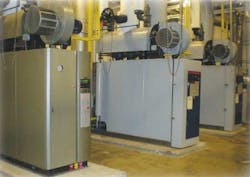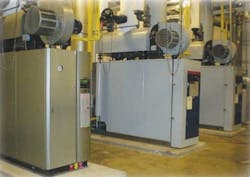Pepsi Bottling Ventures LLC, the third largest Pepsi Cola franchise, needed an efficient steam system for its new flagship bottling plant in Raleigh, NC. The plant planned to use the system to heat water for sanitizing its filling equipment and water-filtration system as well as a heat source for bottle warmers.
Seeking fuel and water economy and a compact design, the company researched boilers on an international basis and chose three Miura LX-200 low-pressure steam boilers. Suntory International, one of PBV’s owners, assisted in the decision by providing information based on their successful use of Miura boilers in facilities in Japan.
“We use steam running through a heat-exchanger to heat water for our CIP [Clean-In-Place] system, which provides hot water for cleaning and sanitizing our batch tanks, pipes, and other internals of our bottle- and can-filling equipment,” said Plant Engineer Dale Stein. “We also use the direct steam for sanitizing our carbon beds for our water-filtration system.”
“We originally installed two Miura steam boilers seven years ago when the plant was built,” said Scott Jamison, VP of Engineering at Pepsi Bottling Ventures. “Suntory, our principal owners, recommended that we consider Miuras for energy efficiency and floor-space savings.”
Miura boilers feature a “once-through” design that produces steam in just five minutes (or less). In addition to On-Demand Steam, the once-through vertical-tube design can, on average, save as much as 20 percent annually on fuel costs over other boiler designs. (This number is likely to increase over time, given the Energy Information Administration’s projected 72 percent growth in energy costs during the next 20 years.)
The technology also produces BHP outputs comparable to much larger units, but with lower water consumption and a more compact footprint, which can reduce new construction costs and better use existing boiler-room space.
Pepsi Bottling Ventures is using three Miura LX-200 low-pressure steam boilers at its Raleigh, NC, plant.
“We recently added a third Miura LX-200 boiler for an expansion that provides ‘blow-fill’ capabilities,” Jamison said. “We’re actually blowing and filling the bottle all in one process. The new system allows us to ‘lightweight’ our bottle and go from 15 gram-plus plastic down to a 10 gram bottle. The installation of the third Miura LX-200 boiler was done to add additional steam capacity for the CIP processes for that line. We have a central system where we heat cleaning solutions up to temperature and use hot water for sterilization of the contact part of the fillers and where the ingredients run through.”
“Because Miura boilers use a lot less floor space, adding a new one was not a big deal,” Jamison said. “We had to change some piping when we added the third boiler, but otherwise the installation was pretty seamless. We are able to fit three Miura 200’s in our boiler room, and have other processes in the room along with the boilers, which we would have never been able to do otherwise.”
“Having the third boiler is great because we can rotate them in and out – especially when it comes to blow-downs – and not have to worry about taking our production down,” Stein said. “We can keep up with the demand.”
Computerized Control
The boilers are controlled by a BL Micro Controller Boiler Control System, which helps users optimize load management, energy efficiency, reduced water consumption. System monitoring and diagnostics are also included. A panel on the front of Miura’s LX and EX boilers presents instant, status information from multiple monitoring points. Should a condition arise, the system identifies it and suggests a solution in plain, descriptive English. Featuring simple, intuitive programming and operation, the system is easy to set up, program, and operate. Boiler operations can also be monitored via an Online Maintenance System with a “sliding window feature” that records events four seconds before they occur for quick identification and correction.
Reduced Environmental Footprint
As a result of their energy-efficient design, the boilers output reduced levels of harmful emissions such as carbon dioxide and nitrous oxide. The company’s gas-fired/Low-NOx LX Series steam boilers are designed to eliminate 75 percent of the harmful emissions of standard gas-fired boilers. Miura Boiler’s LX Series steam boilers provide industry-leading reduced NOx emissions as low as 9 ppm. (standard gas-fired boilers, meanwhile, produce pollutants at a rate of 80 ppm).
“Miura boilers also use low water – 40 gallons is about all you need in them – and that makes the plant more energy-efficient because you don’t need to keep a large volume of water hot all the time,” Stein said. “We are always making sure that we’re utilizing water in the best manner so we don’t waste it. And we recycle everything we can.”
“Another good feature are the Economizers that came with our Miura boilers,” he said. “They also help with energy efficiency. You’re trying to get that water as hot as you can before you turn it into steam, so if you can grab that energy and transfer those BTU’s it means you’re using less natural gas.”



